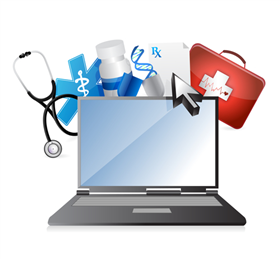Since people started working from home due to the COVID-19 crisis, risk has had gone up! Medical ID Theft, financial and non-financial identity theft, fraud and scams have significantly increased.
Keyword phrases such as cybercrime, cyber thieves, data breach, digital spying, identity theft, personal privacy, phishing, and reputational risk have been reported and written about relating to both individuals and businesses more than ever.
As if it was not enough to constantly fight hackers and scammers at the office, most American workers are now fighting the same hackers, scammers and ID theft criminals remotely, from our “private” homes.
Understanding that many people live their lives online through social media, dating websites, reading the news, and the use of smartphones – the COVID-19 crisis has increased access points to the American consumer and worker more than ever.
One example of a new access point for many consumers is Telehealth.
According to the Centers for Disease Control (CDC) June 10, 2020 update titled Using Telehealth to Expand Access to Essential Health Services during the COVID-19 Pandemic (please see here), “Telehealth services help provide necessary care to patients while minimizing the transmission risk of the COVID-19 virus to healthcare personnel (HCP) and patients” and “while telehealth technology and its use are not new, widespread adoption among Healthcare Providers and patients beyond simple telephone calls has been relatively slow.”
The CDC stated that recent policy changes during the COVID-19 pandemic have reduced barriers to telehealth access and have promoted the use of telehealth as a way to deliver acute, chronic, primary and specialty care that can help improve patient health outcomes.
However, and while Telehealth is a timely, valuable and useful tool, this June 22, 2020 article titled Security Experts Warn Of Elevated Threat Of Medical ID Theft During Coronavirus Pandemic (please see here) reported that “the coronavirus pandemic presents a greater threat for medical identity theft as patients interact with the health care system.”
One security expert, Randy Pargman, a former senior computer scientist with the Federal Bureau of Investigation (FBI) said that “companies across the board are more susceptible to theft of personal information during this pandemic because the attackers know they can take advantage of this situation.”
Pargman also said, “patient files are rife with personal data ranging from social security numbers to insurance information.”
Whether it is a cybercriminal hacking medical files or the insider threat stealing medical files, I am certain that Telehealth services have just as many vulnerabilities as the many healthcare systems, hospitals, and medical groups that have already experienced data breach events.
As we continue to work from home, we need to be more vigilant than ever about the cyber scams, phishing scams, hackers, and insider threats that are targeting our online presence – including Telehealth services.
by Mark Pribish
Learn more: Health Care Schemes & COVID-19 Pandemic
